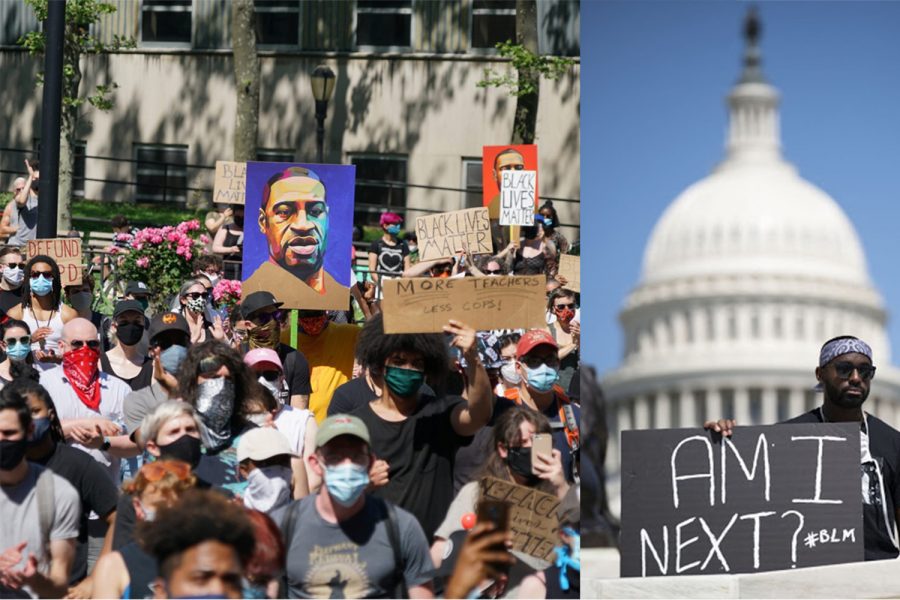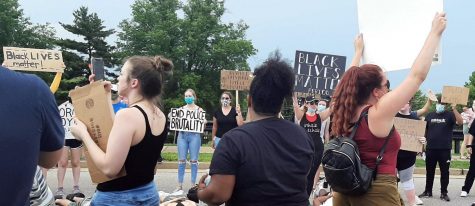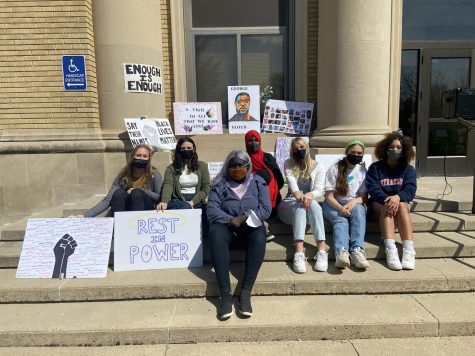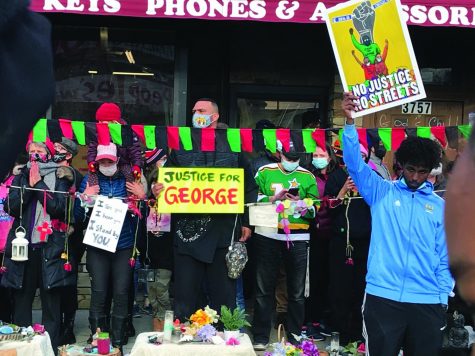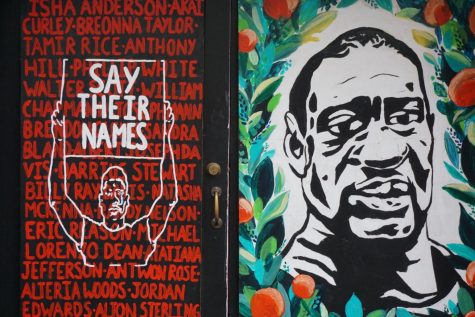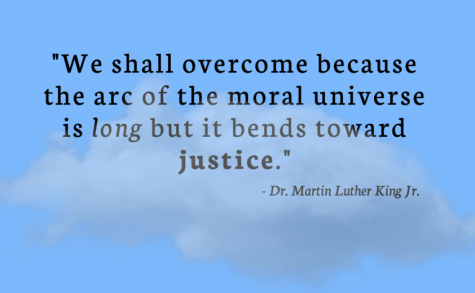Progress must lead to permanent change
A historic social victory marks a stepping stone towards future progress
The verdict in the trial of former police officer Mr. Derek Chauvin April 20 is only the first step in a long journey towards racial justice and police accountability in the United States.
April 28, 2021
In a historic court decision April 20, a Minneapolis jury found former police officer Mr. Derek Chauvin guilty of second-degree murder, third-degree murder, and second-degree manslaughter for his involvement in the high-profile murder of Mr. George Floyd in May 2020, according to The New York Times. While Mr. Chauvin’s guilty verdict represents an impactful social victory that sets a new standard for police accountability in the United States, it does not ensure long-term justice. Politicians, activists, and citizens must now turn their attention to addressing underlying systemic issues and pursuing permanent changes in policy.
Mr. Floyd’s story became a rallying force in the struggle for racial justice. It sparked the reinvigoration of the Black Lives Matter movement last summer and triggered international demonstrations against police brutality, racial profiling, and discrimination, according to The New York Times. However, much of the progress that last week’s court decision made now appears ephemeral after the murder of Mr. Duante Wright April 11. This latest instance of police brutality happened during a traffic stop in Brooklyn Center, Minnesota, approximately ten miles from the courthouse in which the Chauvin trial took place, according to abcnews.go.com.
As demonstrations against the murder of Mr. Wright begin to fill television screens across the nation, it becomes more apparent that the country is trapped in a vicious cycle. Too often, instances of racially-motivated violence occur, public outcry ensues, and yet government officials fail to pass concrete legislation that would prevent another incident of police brutality. The death of Mr. Wright, and the numerous other incidents of police violence against communities of color in the past year, reveal that while Mr. Chauvin’s guilty sentence marks a historic victory in the struggle for racial justice, it does not carry the much hoped for immediate impact.
Many Americans regard Mr. Floyd as a symbol for achieving social justice, but the journey towards true progress is far from over. To ensure true justice for Mr. Floyd, government officials need to pass legislation that guarantees that history will not repeat itself. This court decision alone cannot provide a concrete solution to the United States’ clear problem with racial inequality and police brutality as it does not bring forth any changes to existing policies.
National politicians and activists are beginning to realize the need for policy change and have vowed to take action. In a press release April 20, Ms. Cori Bush, United States Congresswoman and advocate for the Black Lives Matter movement, spoke on the importance of achieving true justice for minorities in America. She detailed her plans to introduce systemic reforms that will benefit her own congressional district in St. Louis, Missouri, as well as the rest of the country.
“We’ve all been forced to grapple with the question: What is justice? Because our criminal-legal system is not a just system—it’s a violent and oppressive one,” Ms. Bush said, according to bush.house.gov. “A just world is one where George Floyd is never murdered. It’s one where Daunte Wright isn’t pulled over for having air fresheners hanging from his rearview mirror. It’s one where Black lives matter. These are the same demands we had on the streets of Ferguson. These are the demands we brought to Congress. And, together, we will continue working on an ambitious set of policy proposals to transform public safety and to ensure communities like St. Louis no longer live under the constant threat of police violence.”
Ms. Bush is one of the numerous members of Congress who pledged to enact legislative reform. In a press briefing after the announcement of the court verdict in the Chauvin case, members of Mr. Floyd’s family and lawyers involved in the case called on Congress to pass the George Floyd Justice in Policing Act. Co-sponsors of this legislation, California Representative Ms. Karen Bass, New York Representative Mr. Jerrold Nadler, New Jersey Senator Mr. Cory Booker, and current Vice President Ms. Kamala Harris, succeeded in passing the bill through the House of Representatives in June 2020, but it failed to clear the Senate.
Notable aspects of the bill include a legal requirement for all law enforcement officers to undergo training on discriminatory profiling and a law that only permits officers to use deadly force as a last resort after all alternative de-escalation techniques have failed. The legislation would also enforce federal bans on the use of chokeholds and no-knock warrants in drug cases, as well as a law that enables individuals to sue for civil damages when police officers violate their constitutional rights, according to poynter.org.
Mr. Benjamin Crump, attorney for the Floyd family, hopes that the high-profile nature of this case will encourage the passage of the bill. He hopes that, as a result, Mr. Floyd’s death will serve as more than a symbolic victory.
“Justice for Black America is justice for all of America,” Mr. Crump said, according to nbcnews.com. “This case is a turning point in American history for accountability of law enforcement and sends a clear message.”
Featured Image by Leah Allen ’22
This story was originally published on King Street Chronicle on April 27, 2021.





























![IN THE SPOTLIGHT: Junior Zalie Mann performs “I Love to Cry at Weddings,” an ensemble piece from the fall musical Sweet Charity, to prospective students during the Fine Arts Showcase on Wednesday, Nov. 8. The showcase is a compilation of performances and demonstrations from each fine arts strand offered at McCallum. This show is put on so that prospective students can see if they are interested in joining an academy or major.
Sweet Charity originally ran the weekends of Sept. 28 and Oct. 8, but made a comeback for the Fine Arts Showcase.
“[Being at the front in the spotlight] is my favorite part of the whole dance, so I was super happy to be on stage performing and smiling at the audience,” Mann said.
Mann performed in both the musical theatre performance and dance excerpt “Ethereal,” a contemporary piece choreographed by the new dance director Terrance Carson, in the showcase. With also being a dance ambassador, Mann got to talk about what MAC dance is, her experience and answer any questions the aspiring arts majors and their parents may have.
Caption by Maya Tackett.](https://bestofsno.com/wp-content/uploads/2024/02/53321803427_47cd17fe70_o-1-1200x800.jpg)
![SPREADING THE JOY: Sophomore Chim Becker poses with sophomores Cozbi Sims and Lou Davidson while manning a table at the Hispanic Heritage treat day during lunch of Sept 28. Becker is a part of the students of color alliance, who put together the activity to raise money for their club.
“It [the stand] was really fun because McCallum has a lot of latino kids,” Becker said. “And I think it was nice that I could share the stuff that I usually just have at home with people who have never tried it before.”
Becker recognizes the importance of celebrating Hispanic heritage at Mac.
“I think its important to celebrate,” Becker said. “Because our culture is awesome and super cool, and everybody should be able to learn about other cultures of the world.”
Caption by JoJo Barnard.](https://bestofsno.com/wp-content/uploads/2024/01/53221601352_4127a81c41_o-1200x675.jpg)




